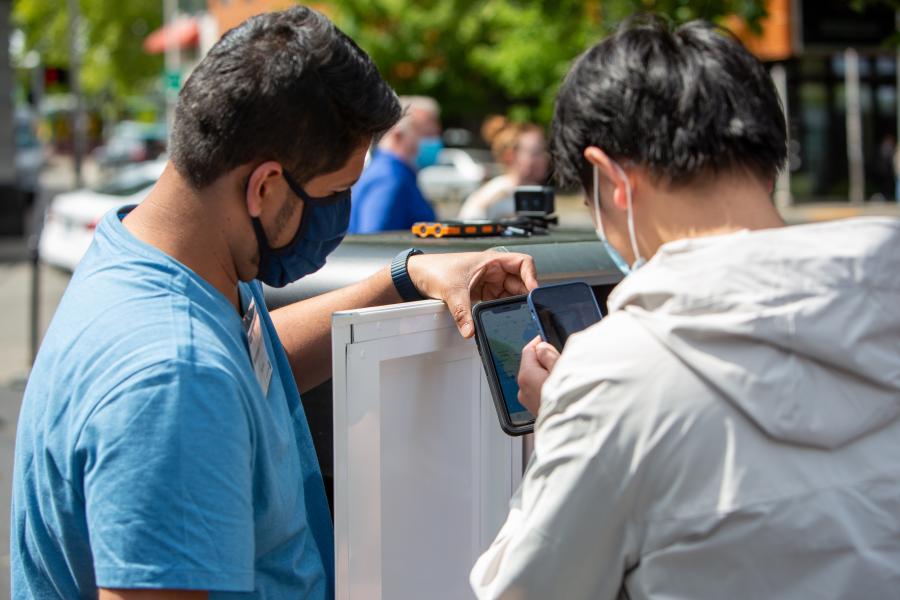
December 10, 2021 — The Urban Freight Lab is pleased to announce positive results produced from our Seattle Neighborhood Delivery Hub (Neighborhood Hub) pilot projects, one of the nation’s first zero-emissions last-mile delivery projects, which operated in Seattle’s Uptown neighborhood last April through July, in collaboration with the City of Seattle, and tech and delivery companies AxleHire, BrightDrop, Coaster Cycles, and REEF.
The Neighborhood Hub served as a testbed for Urban Freight Lab members to test and evaluate innovative sustainable urban logistics strategies on the ground, and also was an important part of the City of Seattle’s Transportation Electrification Blueprint, which included setting the goal of transitioning 30% of goods delivery to zero emissions by 2030.
Overall results demonstrate the potential for a central drop-off/pick-up location for goods and services like the Neighborhood Hub to enable productive and more environmentally sustainable urban last-mile delivery, significantly reducing emissions and vehicle congestion on a large scale by deploying ecargo bikes to complete the last mile of delivery.
In comparison to traditional truck delivery, the Neighborhood Hub — using only a single e-cargo bike — reduced tailpipe CO2 emissions by 30% and vehicle miles traveled (VMT) by 50% per package; and eliminated an overall 356 truck miles in the neighborhood (.65 truck miles per package).
What We Learned
Key findings:
- Electric-assist cargo bikes (ecargo bikes) can replace trucks more than mile for mile: The Neighborhood Hub found that ecargo bikes traveled 50% fewer miles per package in comparison to traditional truck routes operating in the same neighborhood by the same carrier. Replacing 1.4 truck mile with one ecargo bike mile could reduce vehicle miles of travel (VMT) and replace large vehicles with smaller, more nimble modes.
- A Neighborhood Hub can significantly reduce CO2: Ecargo bikes reduced tailpipe CO2 emissions by 30% per package compared with traditional truck routes. With an ebike delivery system, the only notable CO2 emissions were produced by the internal combustion engine trucks re-supplying the Neighborhood Hub.
- Networked Neighborhood Hubs could even further reduce CO2 emissions: Depending on the number of Hubs, location, and goods volume, CO2 reductions per package could be increased from 30% to 40% or 50%, because re-supply trips would be shared by Hubs and trucks would be fully loaded to serve an entire network route.
- Ecargo bikes removed .65 truck miles per package delivered, leading to an overall reduction of 365 truck miles in the Uptown neighborhood. Ebikes could also reduce congestion, as they take up less space on the street than a truck, which could also improve traffic safety, air quality, noise pollution, and preservation of neighborhood cultural sites.
- Ecargo bikes delivered fewer packages per hour than traditional trucks: The ecargo bike performed eight deliveries per hour, compared with 19 deliveries by truck on a comparable route. Urban Freight Lab researchers expect to see improvement in this metric with refinement and expansion of the ecargo bike delivery model, and provided suggestions for how to do so.
Partners and Products
The Neighborhood Hub was a collaboration between the Urban Freight Lab and our like-minded members and partners working together to test sustainable urban logistics solutions, new technologies, vehicles, and delivery models:
- The Urban Freight Lab tested a common carrier parcel locker system that could delivery density and reduce dwell time and failed deliveries, both of which produce congestion, emissions, and increased costs.
- Coaster Cycles tested an electric-assist cargo bike fleet that could provide an agile, sustainable last-mile delivery solution in a dense urban area, mitigate the emissions, congestion, and noise produced by traditional truck delivery.
- AxleHire tested last-mile delivery routing software aimed to provide routing to drivers that uses the fastest, most efficient routes possible.
- BrightDrop tested a propulsion-assisted electric pallet (EP1) that could reduce package touch points, costs, and physical strain on the labor force while optimizing the movement of goods over short distances.
- REEF tested a neighborhood kitchen, aimed to reduce a restaurant’s footprint, increase sustainability, and reduce overhead costs.
- STAR Lab tested its Mobile Unit for Sensing Traffic (MUST) comprehensive edge computing device that collects data on vehicle, pedestrian, and bicycle volumes, travel time, and speed estimates, enabling researchers to assess the performance of the Neighborhood Hub.
The final report: The Seattle Neighborhood Delivery Hub Pilot Project: An Evaluation of the Operational Impacts of a Neighborhood Delivery Hub
More about the project: Common Microhub
Read more:
About the Urban Freight Lab (UFL): An innovative public-private partnership housed at the Supply Chain Transportation & Logistics Center at the University of Washington, the Urban Freight Lab is a structured workgroup that brings together private industry with City transportation officials to design and test solutions around urban freight management. Since launching in December 2016, the UFL has completed an innovative suite of research projects on the Final 50 Feet of delivery, providing foundational data and proven strategies to help cities reduce truck dwell times in load/unload spaces, and failed first delivery attempts by carriers, which lowers congestion, emissions, and costs.